June 10, 2009
I was asked to put together a few resources for the high school grads at church. I thought I’d share the wealth with the World Wide Web.
Below you’ll find helpful and hopefully meaningful resources to guide you as you embark on adulthood. I especially recommend the two blogs. The most valuable resource of all, though, is people. Get involved in your own way on campus and in a local church. But don’t just hang out with people your own age—that’ll make you boring. Be sure to introduce yourself to your professors and tell them thank you (will likely turn that B+ into an A). I’ve been teaching and learning from college students for a really long time. So I know quite a bit about college stuff; and a decent amount about life stuff too—you can always ask me anything. The whole world is before you; but you never have to face it, with all its joys and hardships, alone.
Many congratulations and blessings.
Renea
Bookmark This
GoCollege.com
Here you’ll find really good tips for getting the most out of the really (sometimes really, really) expensive education you’re getting. Classroom lectures, writing assignments, and even exams can be a lot different in college than they were in high school. The tips on this website can help make the transition smoother.
Biblos.com
Biblos.com is this great website I’ve only recently discovered. It’s a one-stop-shop for all your bible study tools including concordances, commentaries, maps, pictures, devotions, and of course the Bible itself in several different translations and languages.
EveryStudent.com
I’m really pumped about this website. It’s a place where no question about God or life is out of bounds. When your friends have questions about God and Christianity, or when you have questions yourself, this website can help. In college you’ll do a lot of exploring, discovering, and learning about yourself: what you think about God, Christianity, the way the world is, the way it should be. This website is designed to guide you on that journey. Be sure to check out Life Issues, which touches on topics such as sex, beauty, racism, and shame.
Probe.org
Curious about Genesis and evolution? Need help answering the tough questions your friends have about Christianity? Whether you want to learn more about your friend’s religion, are struggling with questions like — Why do bad things happen to good people? — or you need a credible source for the paper you’re writing, Probe.org is an excellent resource that can help you think through some really tough topics.
Blogs
Living Spirituality
Living Spirituality offers helpful, encouraging, and even sometimes convicting devotionals. It also provides a weekly discussion about real life stuff. These discussions are helpful as we try to live like Jesus in our everyday lives.
Surviving College Life
Surviving College Life is a really cool blog that’s incredibly comprehensive. Not only will it be helpful as you prepare to arrive on campus. This will be something you’ll find useful throughout your college years as you move from dorms to apartments, friendships to romances, and from major to major. The above link is a list of all the posts divided by topic. So whether you’re looking for time management tips, study aids, roommate advice, financial aid resources, or fitness facts, Surviving College Life can help give you a heads up and point you in a good direction.
Book Buzz
“Do not conform any longer to the pattern of this world, but be transformed by the renewing of your mind.” Romans 12:2
This brief list of books includes stuff I read in college that was really important to my Christian walk, as well as a few books I wish I had read in college. They’re books I hope you will find helpful as you journey with Jesus and strive to think christianly. (Don’t worry; they’re not just “smart people” books. Most of these are very easy to read.)
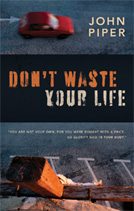 Don’t Waste Your Life
Don’t Waste Your Life
–John Piper
When Christ gave us real life, he gave our lives meaning and purpose. Don’t Waste Your Life is about living on purpose a life passionate for God and people.
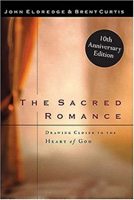 The Sacred Romance: Drawing Closer to the Heart of God
The Sacred Romance: Drawing Closer to the Heart of God
–Brent Curtis & John Eldredge
This is not a girly book; don’t let the title fool you. The Sacred Romance was a really important book for me when I was in college. It helped me understand the big picture of the Bible: the story of God and the story of my own life. It helped me understand the difference between living by the rules and living spiritually.
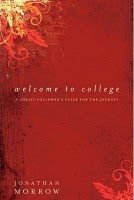 Welcome to College: A Christ-follower’s Guide for the Journey
Welcome to College: A Christ-follower’s Guide for the Journey
–Jonathan Morrow
Welcome to College includes chapters on the problem of evil and suffering, Christology, ethics and much more. You will also find a broad collection of practical topics: health, sex and dating, finances, Internet use, alcohol. This book provides unique and much–needed help for navigating the head–spinning newness of college life.
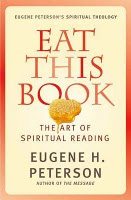 Eat This Book: The Art of Spiritual Reading
Eat This Book: The Art of Spiritual Reading
–Eugene Peterson
This is a really helpful book about how to read and interpret and understand the Bible, how to let the Scriptures nourish and feed us, how to live the Scriptures as they are the Living Words of God.
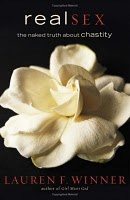 Real Sex: The Naked Truth about Chastity
Real Sex: The Naked Truth about Chastity
–Lauren F. Winner
Winner talks about sex in a realistic way. She sorts through the confusing messages we hear about sex from both the world and the church, and helps us think about sex and romantic love within the big picture of God’s story. Real Sex provides biblical and practical guidance for unmarried Christians who desire to honor God with their sexuality and dating relationships.
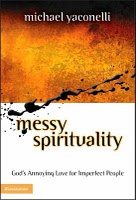 Messy Spirituality: God’s Annoying Love for Imperfect People
Messy Spirituality: God’s Annoying Love for Imperfect People
– Mike Yaconelli
This small book says big things about what being a Christian looks like. It reminds us that we’re all human in need of God’s grace; that there’s no such thing as the ideal Christian—there’s no one-size-fits-all pattern of spirituality.
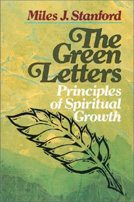 The Green Letters
The Green Letters
–Miles J. Stanford
The Green Letters is about spiritual growth. It’s one of those books you can pick and choose what you want to read by scanning over the Table of Contents; that is, the chapters don’t necessarily have to be read in order. This book will challenge you to live less selfishly, or we could say, less as a self-follower and more as a Christ-follower.
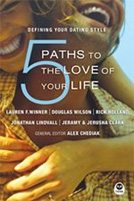 5 Paths to the Love of Your Life: Defining Your Dating Style
5 Paths to the Love of Your Life: Defining Your Dating Style
–Alex Chediak
There are basically five different approaches to romantic love from the Christian perspective. This book gives you an overview of these five views, their advantages and disadvantages, and the logic and Scripture behind them. So you can decide for yourself which path you relate to most, which enables you to be intentional about biblical, christianly romance.
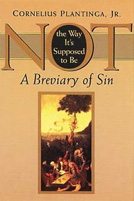 Not the Way It’s Supposed to Be: A Breviary of Sin
Not the Way It’s Supposed to Be: A Breviary of Sin
–Cornelius Plantinga Jr.
What is sin? What are the effects of sin? How do we think and talk about sin (if at all)? How do we deal with sin? These are some of the questions discussed in this small, but impactful book on sin. You’d think a book all about sin would be depressing, but Plantinga understands that sin is only the distortion of something originally good; and that though things aren’t the way they’re supposed to be now, they will be one day soon when Christ returns.
This blog post originally appeared at reneamac.com/2009/06/10/hail-the-conquering-graduates/
 Messy Spirituality is about exactly that. It’s a story of and a guide to rightly rejecting neat, sanitized spirituality, breaking out of the plastic shrinkwrap of systemitized religion, and embracing abundant life with all its messes, failures, complexities, questions, joys, triumphs, tensions, paradoxes… which requires us to embrace grace. It requires the sometimes desperate acknowledgment of our constant need of grace, which turns us into people of Grace—the people we’re all supposed to be from Eden, people of God.
Messy Spirituality is about exactly that. It’s a story of and a guide to rightly rejecting neat, sanitized spirituality, breaking out of the plastic shrinkwrap of systemitized religion, and embracing abundant life with all its messes, failures, complexities, questions, joys, triumphs, tensions, paradoxes… which requires us to embrace grace. It requires the sometimes desperate acknowledgment of our constant need of grace, which turns us into people of Grace—the people we’re all supposed to be from Eden, people of God.
 The Sacred Romance: Drawing Closer to the Heart of God
The Sacred Romance: Drawing Closer to the Heart of God  Welcome to College: A Christ-follower’s Guide for the Journey
Welcome to College: A Christ-follower’s Guide for the Journey Eat This Book: The Art of Spiritual Reading
Eat This Book: The Art of Spiritual Reading  Real Sex: The Naked Truth about Chastity
Real Sex: The Naked Truth about Chastity
 5 Paths to the Love of Your Life: Defining Your Dating Style
5 Paths to the Love of Your Life: Defining Your Dating Style  Not the Way It’s Supposed to Be: A Breviary of Sin
Not the Way It’s Supposed to Be: A Breviary of Sin